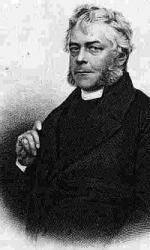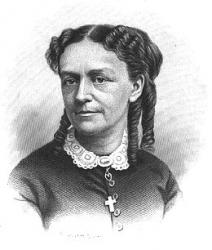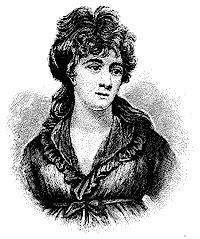Planning worship?
Check out our sister site, ZeteoSearch.org,
for 20+ additional resources related to your search.
- |
User Links
Person Results
‹ Return to hymnal



Export as CSV
James Boden
1757 - 1841 Hymnal Number: d70 Author of "Come all ye [you] saints of God" in Hymns for the Use of the Brethren in Christ Boden, James, was born April 13, 1757, in the house at Chester long occupied by Matthew Henry, and educated for the Congregational Ministry at Homerton College. In 1784 he became the pastor of the Independent Chapel, Hanley; and, in 1796, of the Queen's Street Chapel, Sheffield. This last charge he held for nearly 43 years. He died at Chesterfield, June 4, 1841. In 1801 he assisted Dr. Williams, of the Masborough Theological College, near Sheffield, in compiling A Collection of above Six Hundred Hymns designed as a New Supplement to Dr. Watts's Psalms & Hymns, &c, Doncaster, 1801. This collection is known as Williams and Boden, and to it is traced the anonymous modern version of "Jerusalem, my happy home" (q.v.). To this collection Boden contributed, under the signature "Boden” the following hymns:—
1. Bright source of everlasting love. Charity Sermon.
2. Come, all ye saints of God. Passiontide.
3. Come death, released from dread. Death.
4. Our great High Priest we sing. Christ the H. Priest.
5. Shall sin, that cruel foe? Lent.
6. Triumphant sing ye favoured [ransom'd] saints. Jesus, all in all.
7. We come, dear Jesus, to Thy throne. Prayer Meeting.
Of these hymns, No. 1 appeared in the Evangelical Magazine Aug., 1798. Most of them are still in common use, but chiefly in America. They are of no special merit.
In the Gospel Magazine, 1777, there are a few hymns under the signature "J-----s B-----n, Chester." Of these, one only (8), "Ye dying sons of men" [Invitation), was given in the Williams and Boden Collection, and then, not with the full signature of "Boden," but as by “B___." On this evidence mainly the hymn has been ascribed to James Boden. It appeared in the Gospel Magazine twice in 1777, in Feb. and in Aug. It may be by our author; but seeing that it alone of the eight hymns above noted is signed "B-----," and was given in the Gospel Magazine in 1777, and that the rest are signed "Baden," and did not appear in the Gospel Magazinein 1777, or in any other year, we regard the evidence as somewhat inconclusive. It has been suggested that possibly the "J-----s B-----n, Chester," was his father. The signatures appended to the hymns in the 1st edition of Williams & Boden, 1801, were omitted from the 2nd edition, 1803, and portions of the Preface were rewritten.
-- John Julian, Dictionary of Hymnology (1907)
James Boden
Roswell Park
1807 - 1869 Person Name: R. Park Hymnal Number: d254 Author of "Jesus spreads his banner o'er us" in Hymns for the Use of the Brethren in Christ Park, Roswell, D.D., of the Protestant Episcopal Church, was born at Lebanon, Connecticut, Oct. 1, 1807, and educated at Union College and West Point. Previous to receiving Holy Orders he was in the army, and also held the appointment of Professor of Chemistry in the University of Pennsylvania. He was ordained in 1843, was President of Racine College, Wisconsin (1852-59), Chancellor of the same College (1858-63); and Principal of a school in Chicago from 1863 to his death. He died at Chicago, July 16, 1869. He published Sketch of West Point, 1840; Pantology, 1841; Handbook for European Travel, 1853; and Poems, 1836. His best known hymn is for Holy Communion. It begins "Jesus spreads His banner o'er us," and was published in his Poems, 1836. It is in common use in Great Britain and America. [Rev. F. M. Bird, M.A.]
-- John Julian, Dictionary of Hymnology (1907)
Roswell Park
Alice Flowerdew
1759 - 1830 Hymnal Number: d131 Author of "Fountain of mercy, God of love" in Hymns for the Use of the Brethren in Christ Flowerdew, Alice, was born in 1759, and married to Mr. Daniel Flowerdew, who for a few years held a Government appointment in Jamaica, and died in 1801. After his decease Mrs. Flowerdew kept a Ladies' Boarding-school at Islington. During her residence at Islington she was a member of the General Baptist congregation, in Worship Street (now at Bethnal Green Road). Subsequently she removed to Bury St. Edmunds, and some years later to Ipswich, where she died Sept. 23, 1830.
In 1803 she published a small volume of Poems on Moral and Religious Subjects. This work reached a 3rd edition in 1811, and in that edition appeared her well-known harvest hymn, "Fountain of mercy, God of love," q.v. Mrs. Flowerdew's maiden name has not been ascertained. [Rev. W. R. Stevenson, M.A.]
--John Julian, Dictionary of Hymnology (1907)
Alice Flowerdew
Ottiwell Heginbotham
1744 - 1768 Hymnal Number: d16 Author of "And can mine eyes, without a tear" in Hymns for the Use of the Brethren in Christ Heginbothom, Ottiwell, born in 1744, and died in 1768, was for a short time the Minister of a Nonconformist congregation at Sudbury, Suffolk. The political and religious disputes which agitated the congregation, in the origin of which he had no part, and which resulted in a secession and the erection of another chapel, so preyed upon his mind, and affected his health, that his pastorate terminated with his death within three years of his appointment. His earliest hymn, "When sickness shakes the languid corse [frame]," was printed in the Christian Magazine, Feb. 1763. In 1791 the Rev. John Mead Ray communicated several of Heginbothom's hymns to the Protestant Magazine; and in the same year, these and others to the number of 25, were published as:—
Hymns by the late Rev. Ottiwell Heginbothom of Sudbury, Suffolk. Sudbury, Printed by J. Burket, mdccxciv.
These 25 hymns were repeated in J. M Ray's Collection of Hymns from various authors in¬tended as a Supplement to Dr. Watts's Psalms and Hymns, 1799, and 12 in Collyer's Collection, 1812. In modern collections in Great Britain and America the following are in common use in addition to those annotated under their respective first lines:—
1. Blest Jesus, when my soaring thoughts. Jesus, most Precious.
2. Come, humble souls; ye mourners come. Good Hope through Grace.
3. Come saints and shout the Saviour's praise. The Second Advent.
4. Come, shout aloud the Father's grace. Praise to God the Father.
6. Father of mercies, God of love. God the Father.
6. God of our life! Thy various praise. New Year.
7. Great God, let all our [my] tuneful powers. New Year.
8. Hark, the loud trumpet of our God. National Fast.
9. Hark, 'tis your heavenly Father's call. A Prayer to be used by the Young.
10. I ask not [honour] wealth, nor pomp, nor power. Wisdom and Knowledge desired.
11. Now let my soul, eternal King. Praise of the Gospel. Sometimes given as "To Thee, my heart, eternal King."
12. See, mighty God, before Thy throne. Fifth of November; a National Hymn.
13. Sweet peace of Conscience, heavenly guest. A good Conscience.
14. To Thee, my Shepherd, and my Lord. The Good Shepherd.
15. Unhappy city, hadst thou known. Christ weeping over Jerusalem. From this the cento, "And can mine eyes without a tear?" is taken.
16. When sickness shakes the languid corse [frame]. Resignation. Printed in the Christian's Magazine, Feb. 1763, and again in Hymns, &c, 1794.
17. Yes, I will bless Thee, O my God. Praise of the Father. The text is often altered. The cento "My soul shall praise Thee, O my God," in the Unitarian Hymn land Tune] Book, &c, Boston, 1868, is from this hymn.
Most of these hymns are in Collyer's Collection, 1812. There are also 8 in Hatfield's Church Hymn Book, N.Y., 1872, and 7 in the Songs for the Sanctuary, N.Y., 1865. [William T. Brooke]
-- John Julian, Dictionary of Hymnology
Ottiwell Heginbotham
Hodges Reed
Hymnal Number: d235 Author of "Is it true that I must lie in the graveyard" in Hymns for the Use of the Brethren in Christ
Hodges Reed
Christian Nysewander
Editor of "" in Hymns for the Use of the Brethren in Christ
Christian Nysewander
Joseph Dacre Carlyle
1759 - 1804 Person Name: J. D. Carlyle Hymnal Number: d290 Author of "Lord, when we bend before thy [the] throne" in Hymns for the Use of the Brethren in Christ Joseph Dacre Carlyle was born at Carlisle, in 1759. He became Professor of Arabic in the University of Cambridge, in 1794, and afterwards Vicar of Newcastle-on-Tyne. He was the author of several works. His death occurred in 1804.
--Annotations of the Hymnal, Charles Hutchins, M.A., 1872
======================
Carlyle, Joseph Dacre, B.D., some time Professor of Arabic in the University of Cambridge, and afterwards Vicar of Newcastle-on-Tyne, was born at Carlisle, June 4, 1758. In 1799 he accompanied the Earl of Elgin to Constantinople with the object of exploring the literary treasures of the public Library of that city. He extended his journey into Asia Minor, and the islands and shores of the Archipelago. He died at Newcastle, April 12, 1804. Amongst his manuscripts were Poems, suggested chiefly by Scenes in Asia Minor, Syria, &c. These were published under that title, in 1805, by Susanna Maria Carlyle. His hymns, which appeared in J. Fawcett's Psalms & Hymns, Carlisle, 1802, include, "Lord, when we bend before Thy throne "—his most popular production; a paraphrase of the Lord's Prayer,"Father of heaven, Whose gracious hand"; and "Lord, when we creation scan." His works include Specimens of Arabian Poetry, 1796.
--John Julian, Dictionary of Hymnology (1907)
Joseph Dacre Carlyle
David E. Ford

1797 - 1875 Hymnal Number: d530 Author of "Shall we meet, shall we meet" in Hymns for the Use of the Brethren in Christ Ford, David Everard, son of a Congregational Minister at Long Melford, was born there on Sept. 13, 1797. He became pastor of the Congregational Church at Lymington, in Oct. 1821; Travelling Secretary to the Congregational Union in 1841; and pastor of Greengate Chapel, Salford, Manchester, in 1843. He died at Bedford, Oct. 23, 1875. Mr. Ford published several works including, Hymns chiefly on the Parables of Christ, 1828. From this is taken, (1) "Earthly joys no longer please us" (Heaven Anticipated). (2) "How vain is all beneath the skies" (Heaven Anticipated). These are in American common use. See Hymns of the Church, 1869, and Laudes Domini, 1884. Another of his hymns in common use from the same work, p. 107, is:—"Almighty Father, heavenly Friend" (Old and New Year). This is in Dale's English Hymn Book, 1874.
--John Julian, Dictionary of Hymnology, Appendix, Part II (1907)
David E. Ford
Phoebe A. Hanaford

1829 - 1921 Hymnal Number: d67 Author of "Cast thy bread upon the waters Thinking not 'tis thrown away" in Hymns for the Use of the Brethren in Christ Hanaford, Phoebe A., née Coffin, daughter of George F. Coffin, was born at Nantucket Island, May 6, 1829. Mrs. Hanaford is an Universalist, and one of their recognized ministers. Her hymn "Cast thy bread upon the waters" (Work and Wait), is in the Laudes Domini, N.Y., 1884, and other American collections.
--John Julian, Dictionary of Hymnology, Appendix, Part II (1907)
=================
Born: May 6, 1829, Nantucket Island, Massachusetts.
Died: June 2, 1921, Rochester, New York.
Daughter of Quaker ship owner George F. Coffin, Phoebe was cousin to feminist Lucretia Mott. A gifted writer, she was published in the local paper by the time she was a teenager. She studied Latin and mathematics and taught school for a few years, then in 1849 married Dr. Joseph H. Hanaford. The couple lived in Newton and Reading, Massachusetts, and had two children. Phoebe continued her literary efforts, producing poetry, children’s stories, essays, and biographies (her biography of Abraham Lincoln sold 20,000 copies). She also edited a Universalist magazine, and, urged by Rev. Olympia Brown, she eventually became a Universalist minister (the first woman ordained in New England). She served churches in Hingham and Waltham, Massachusetts; New Haven, Connecticut, and Jersey City, New Jersey. Her works include:
Life of George Peabody
Women of the Century (Boston, Massachusetts: B. B. Russell, 1877)
www.hymntime.com/tch
Phoebe A. Hanaford
Amelia Opie

1769 - 1853 Hymnal Number: d494 Author of "Shall I be mute" in Hymns for the Use of the Brethren in Christ Opie, Amelia, née Alderson, daughter of Dr. Alderson, a physician at Norwich, was born there Nov. 12, 1769. In May 1798 she was married to John Opie, the painter, who died in 1807. Originally Mrs. Opie was an Unitarian, but in 1814 she joined the Society of Friends. Most of her subsequent life she lived at Castle Meadow, Norwich, where she died Dec. 2, 1853. Mrs. Opie's prose works were somewhat numerous, and included Father and Daughter, 1801, a most popular tale; Temper, 1812; Tales of Real Life, 1813; and others. Her poetical works were Miscellaneous Poems, 1802; The Warrior's Return and Other Poems, 1808; Lays for the Dead, 1833, &c. Very few of her poems have come into use as hymns. The best known is “There seems a voice in every gale."
--John Julian, Dictionary of Hymnology (1907)
===================
Opie, Amelia , p. 871, i. Another hymn by Mrs. Opie in common use is "When the disciples saw their Lord" (Travel by Sea and Land), in Com. Praise 1879. Dated 1838.
--John Julian, Dictionary of Hymnology, Appendix, Part II (1907)
Amelia Opie


 My Starred Hymns
My Starred Hymns

